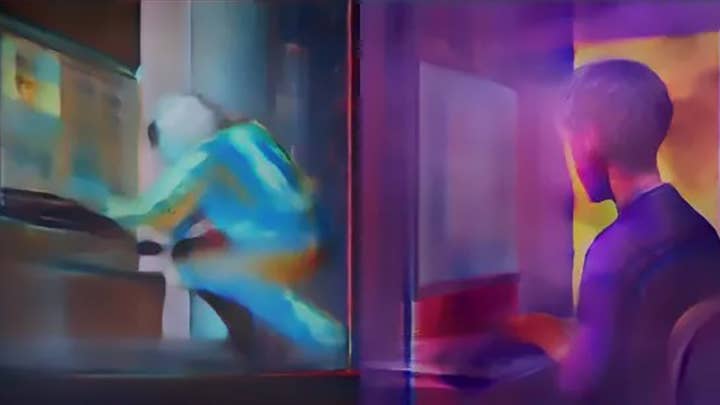The potential and perils of generative AI
Developers discuss the impact machine learning could have on everything from ideation to asset creation to job security
From AI-generated art to ChatGPT's worryingly coherent output, generative AI has been propelled into the limelight over the past two months – but its role in game development still remains unclear.
For those who have missed the recent conversations, generative AI is a tool that can be used to create something from a written prompt. Ask ChatGPT to write a short summary of something and it will do so. Type a description of a person or place – real or fictional – into Midjourney and it will offer you four different pictures that fit your brief.
We reached out to a range of game makers to get their thoughts on this nascent but increasingly prominent technology. Some declined, stating they do not (yet) understand enough about generative AI and the implications of using it to offer insight, but those who did respond were never far from a historical analogy.
Panivox co-founder and veteran developer Philip Oliver liked generative AI to farmers improving their efficiency by using ploughs and later tractors instead of horses, while Code Is Just author and indie developer Shahid Ahmad drew parallels between machine learning and the introduction of industrial automation.
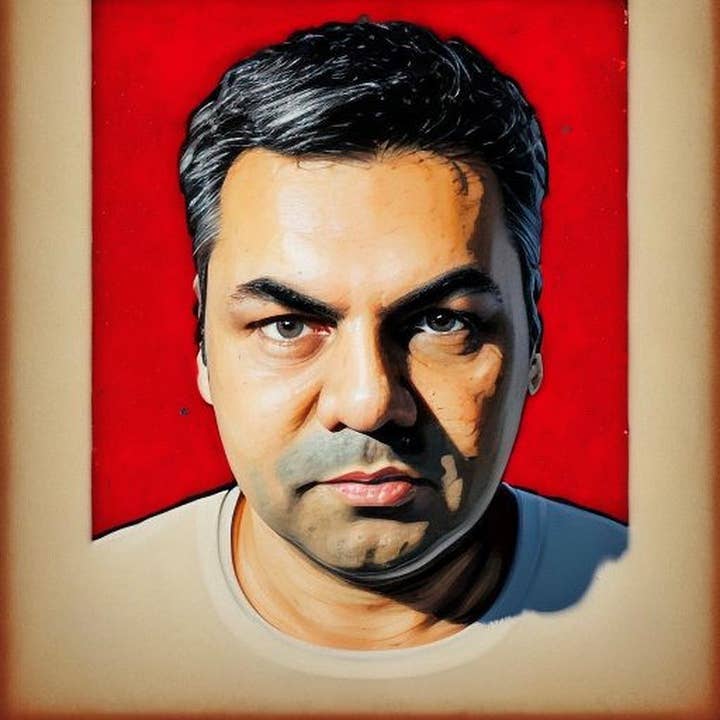
"[That] removed a lot of manual drudgery from our lives through the use of machinery and, more recently, robots. But video games studios producing content at scale haven't benefited from mechanisation until now," he explains.
"It might at first be jarring to hear of mechanisation with what we often think of as art, but most of the assets produced in video games are craft, and craft, guided by humans, can be mechanised at the level of atoms, so why not with bits?"
Bossa Studio co-founder and creator-in-chief Imre Jele adds: "Fundamental shifts in technologies can rearrange entire industries. Those kinds of changes always come with inevitable losses: people and companies will be forced to adapt. And when the change is big enough entire economies could be at peril, and societal changes become necessary. AI could be – some say is inevitably going to be – that drastic a change. I believe generative AI certainly has the potential to rock the games industry on a fundamental level.
"However, there are still challenges ahead. For example, the legal framework for training sets is up in the air with some risk and exposure depending on the outcome of some court cases. So there are some big questions one needs to answer before developing a game using these tools.
"Ultimately, even though this is a very fast developing space, we only have very few actual production ready tools that a company can depend on. So arguably, we’re still a little while from fundamental changes to how we make games."

Rok Breulj, founder and owner of Proxy Studios, says AI can ease the process of content creation, which he considers "the most labour intensive part of video game development." His own team used AI art tools to generate concept art for elements such as buildings in their upcoming 4X strategy title Zephon, but Breulj believes it will eventually be used on a grander scale.
"AI is undoubtedly going to increase the breadth and scope of games," he says. "We should expect bigger worlds and larger games – something I see players screaming for."
He continues: "In some aspects generative AI can be likened to remixing old assets or using asset packs. All of that can be done very tastefully or very distastefully. It’s not inherently bad or good. We shouldn’t be scared of generative AI. Try it out, play with it, explore its limitations and see if it can enhance your workflow."
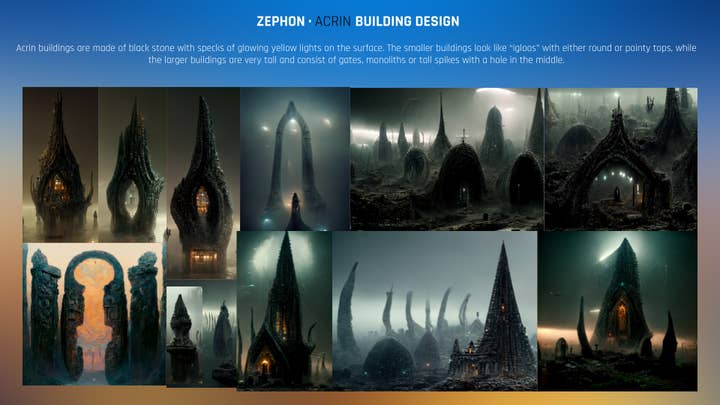
Tom Pigott, CEO and founder of Ludo AI – which offers a tool of the same name designed to help developers prototype game concepts from a series of prompts – says generative AI will be most useful in art design, concept ideation, and asset creation. He claims this will limit costs – not in terms of having fewer staff (more on that later), but the amount of man-hours spent on each of these processes.
"Game developers face three primary problems when developing: expenses, time, and effort," he says. "When faced with these problems combined, the failure rate is drastically increased – and most developers cannot afford all of the necessary tools to stay competitive."
Ahmad emphasises the potential benefits for indies, as using AI will allow smaller studios to "punch above their weight," he says. He points to the example of UK developer Hello Games, which used procedural generation to create No Man's Sky, a game of a scale usually only reached by AAA titles.
"Generative AI will fundamentally change how and what games we create. The question is: How fast?"
Imre Jele, Bossa Studios
However, he warns that AI's output can look "boring or incongruous" if used poorly – one only need to look at the mutated hands produced by AI art tools for proof. Ahmad once again cites Hello Games as an example, stressing that while procedural generation created endless planets and creatures, it was down to human developers to tune their system and select the 'best' output.
Breulj warns that another disadvantage could be that we see the games market "flooded with generative content that is not well-considered." Given the rise of 'asset flip' games on Steam, titles that are cobbled together from premade assets, the use of generative AI in this way is perhaps inevitable.
"It could get harder and harder for thoughtful content to rise to the top – potentially redistributing the spend from development into marketing," he adds.
Pigott stresses that AI tools should be seen as simply that: a tool.
"When speaking about generative AI in the games industry more specifically, this is doubly true," he adds. "You shouldn’t just rely on AI tools, because the results may not always be completely accurate – you see this when looking at examples of awry work from services like Dall-E 2 and ChatGPT online."
Panivox's Philip Oliver expects generative AI to be most useful when planning or in pre-production, saying it can quickly create mood boards and other concept art. He, too, emphasises the need for human guidance to ensure the final game benefits from the use of AI.
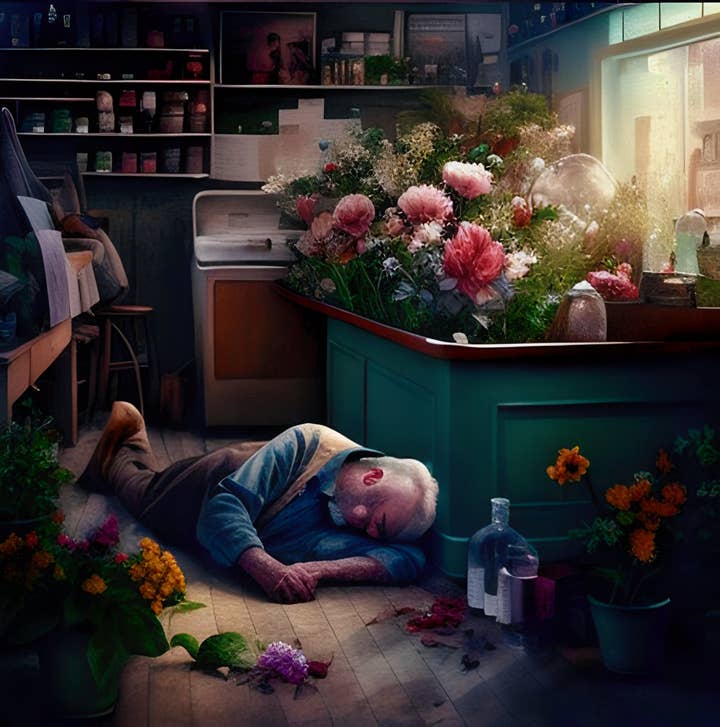
"Generative AI in games should empower and enhance creativity, not replace it," he says. "AI can speed up game development and enable teams to iterate faster. At this year's Global Game Jam, we produced a 20-minute game assisted by AI tools like ChatGPT and Midjourney – it took us just over 60 man hours, demonstrating the potential of generative AI to dramatically speed up the development process.
"AI is a big disruptor in the games industry, but it's important to be curious and embrace new technologies."
The biggest concern around generative AI is whether it will result in job losses. If typing words into Midjourney can generate concept art, why would studios need a concept artist? If it can generate 3D assets that can be placed into a game world, like trees or furniture, what happens to the people manually crafting these today?
Jele says: "In most cases I believe AI will be accelerating workers rather than replacing them. That said there are grave and valid concerns of jobs lost."
He goes on to say there will be more subtle issues to address. For example, a member of his team pointed out that AI might remove the need for low skills jobs in art departments. This would prevent young artists from securing the roles and gaining the experience they need to improve their skills, and the result would be fewer trained staff on the market.
"At the end of the day I don’t think AI replacing jobs is a fleeting concern, but a fact," Jele continues. "Generative AI will not only change but likely entirely displace many jobs. The only argument is how fast that will happen and how far reaching the effects will be.
"History teaches us that you cannot hold back the march of progress. The best option we have is to very carefully consider and prepare for the inevitable effects in our own teams and industry. Worth saying though that the trajectory of AI development suggests that we will face changes on a societal level, and those matters can ultimately only be addressed by tools on that level: universal living wage and other solutions come to mind."
Ahmad adds: "Jobs will change. They've always changed. Decades ago, every team wrote their own graphics engine, and now those jobs are gone. But a lot of drudgery will be taken away. How many chairs need to be modelled? How many tables? Couldn't AI take care of that for us?"
The developers we spoke to say there are also misconceptions around the use of generative AI, ones that are a factor in the rising fear that it will replace jobs. For example, Oliver stresses that no AI tool can create code, art or dialogue on its own.
"Treat AI tools like ChatGPT and Midjounrey as problem-solvers, process accelerators, and creative aids, not replacements for developer creativity," he says. "Game developer tools don't do the work for us, and the same applies to generative AI."
Pigott adds: "People often think that generative AI is a magic box and a mind reader, which just is not the case. Generative AI is a type of machine learning where computers can generate original content in response to prompts from the user.
"Machine learning cannot predict what kind of game a developer wants to create; that can only be done after the user has input prompts. The most important factor in any generative AI tool is still the user – the human – who is using it."
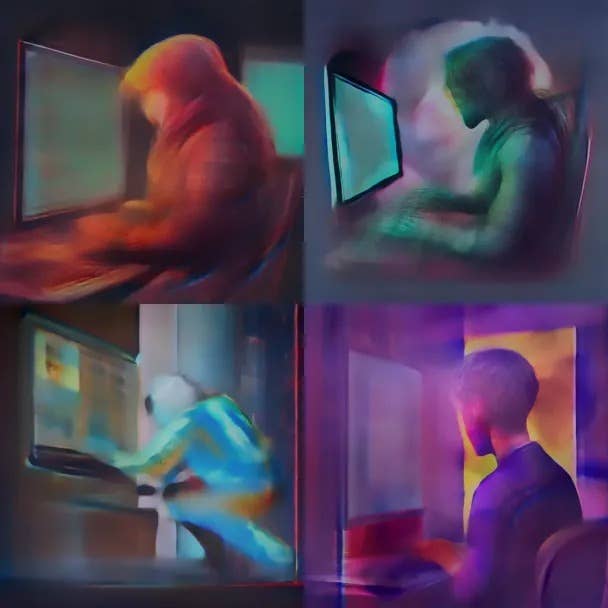
As a further example, the headline image of this article (full image to the left) was generated by Midjourney using the prompt: 'An AI developing a video game.' Even Take-Two CEO Strauss Zelnick assured investors on a recent earnings call that there's no danger of a generative AI tool making a better Grand Theft Auto just because something delivers that prompt.
Ultimately, the developers we spoke to believe AI has the potential to benefit studios of all sizes. AAA developers will be able to create more content with lower costs and become more efficient, while indies will be able to attempt more ambitious projects they would not usually have the resources for.
"The boundaries [between the two] will blur," says Ahmad. "This is a good thing. Eventually, this technology will create a more level playing field provided that AI is accessible, and there's every reason given the history of other tools to believe that this will be the case. Unreal Engine used to cost $500,000 to licence in 2002, and now an indie can use it essentially for free."
Jele even envisages a world where games themselves are able to use AI tools to produce new content on the fly, and content that is tailored to each player's tastes.
"The 'simple' outcome of making bigger games faster is not only a huge step forward but frankly a necessity considering the ongoing arms race of game content scope and quality," he concludes. "But I hope we will also see better and even stranger games – and not just bigger – because of good AI tools.
"I believe generative AI will fundamentally change how and what games we create. The question is: How fast?"
